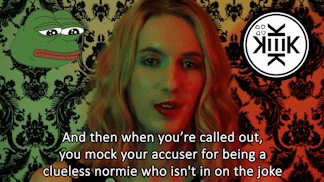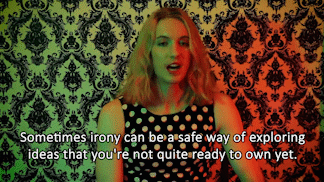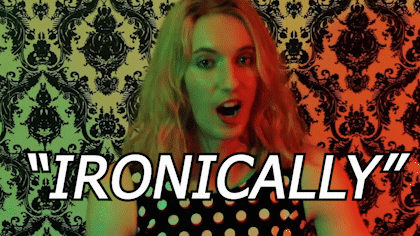Some Day I Want To See A Sci-fi Production Where The Nerd Spouts Twenty Seconds Of Impenetrable Technobabble,
Some day I want to see a sci-fi production where the Nerd spouts twenty seconds of impenetrable technobabble, and the Salt-of-the-Earth Audience Identification Character is just like “well, shoot – it sounds obvious when you put it that way”, and proceeds with the plan without ever demanding a plain English explanation for the benefit of the audience.
More Posts from Thecaffiend and Others








This hit me right in the feels 🥲

✷ Your Last Embrace ✷
Soft skills for the apocalypse
Let’s face it, if the world ends, so many of us will flee somewhere else for safety that we’ll end right back up in communities again. There’s going to be more to it than growing your own food and knitting handspun socks.
I’m linking to resources, but a many of these skills, being interpersonal, are best taught in live trainings by professional instructors, where you can see and feel all the interpersonal dynamics going on in the room, and by experience, trying them out on real people in an educational setting.
When the world ends, it will be helpful to be able to::
Run a meeting
Peacefully negotiate
De-escalate a potentially violent situation
Organize a community
Cope when you’re having a panic attack
Co-regulate to help a child keep calm
Identify community resources
Protest safely and peacefully
Even small local pieces of activism today, like organizing a protest march or lobbying your municipal government to make public spaces more accessible, have a double reward: There’s the work you’re doing, and the skills you learn when you do it.
i was so fucking sad when i was 14 and now when i fold my laundry or see a pool of moonlight on the floor of my bedroom i know that miracles exist. i see love in everything. love sees everything in me too
Hi, I was wondering if you have any tips for being self taught (You're like, extremely brilliant, by the way)
hi, thank you so much, that’s so sweet!!<3 here you are:
a guide to be self-taught for all the knowledge lovers out there
1. Listen to yourself. Don’t judge your thoughts and their form. Most people are MUCH more intelligent and creative than they think they are. They just don’t notice it as they don’t pay attention to their thoughts, don’t value them the way they should.
Buy a notebook. Note every thought that has any meaning, however weird, bad or unsignificant it may seem. Don’t make it a diary, a diary is filtered. It gives you an objective, makes you try to shape your ideas a certain way. Screw the dates, calligraphy, aesthetic, screw making any sense. The whole point is to contain an unchanged stream of consciousness, to keep it unedited, so you wouldn’t lose anything. I call it A documentation of existence - you neither have to agree with what you write, nor believe it’s yours, simply acknowledge it exists.
You have no idea how many times I made a stupid note at 4am that everyone else would ignore but that later on got transformed into a whole project.
2. Sleep well and USE THAT TIME. I’m surprised how few people understand and appreciate the power of sleep. Come on, it’s literally the door to your unconsciousness, the amount of opportunities it gives is astonishing!
I used to not get it. When I was a kid I hated sleep so much, I would refuse to go to bed sometimes as I thought of it as a waste of time. In primary school I wanted to reduce my sleep time so much, I started to highly experiment on it and even followed the Uberman Schedule for some time. Now I know sleep is actually a powerful instrument that can help you increase your potential.
Learn about it, research LD, OOBE (be careful with it though) and most importantly sleep programming. They can all be extremely beneficial! Statistically we’re asleep for 1/3 of our lives so don’t waste that time.
3. Mnemotechnics. Find out what way of remembering information works best for your brain and use it. I especially recommend The Mind Palace Technique. You may’ve seen it on Sherlock and thought it’s pure fiction but I assure you it’s very much real and it’s the most effective mnemotechnic I’ve ever used. Seriously, I’m surprised how much I remember thanks to it.
If you use it right, it’s actually so efficient you may remember those things for years, if not forever - so don’t put useless and stupid stuff there. I once did it and I regret it SO much, it’s been years and this idiotic picture has just engraved in my brain... anyway, MNEMOTECHNICS!
4. Read. Read things you don’t agree with. Read things you hate. Read everything that makes you feel something. Same way with movies, plays, music, etc. Consume as much culture as you can, surround yourself with it. Let your knowledge grow, your viewpoint change, allow yourself to be influenced by the world.
5. Use drugs wisely. And yes, caffeine, theine, nicotine and alcohol do count. They have a massive influence on your brain, please don’t let them destroy it. Be especially careful with cannabis, it lowers your IQ significantly, even used only a handful of times.
6. Acknowledge that you will lose motivation and know what to do about it. It’s perfectly normal! Please never beat yourself up for it, it will only make everything worse. It’s important that you find your own way to deal with it, but if you want to know mine: I just romanticize the hell out of everything. Learning is so much easier and more enjoyable when you do it on your own terms and do it with passion.
Working on a maths assignment an hour before the deadline, irritated you have to do so, trembling in fear that you won’t make it on time? terrible, horrendous, worst experience ever.
BUT
Sitting under a tree, birds singing in the background, while you’re doing mathematical equations, thus using a beautiful way of allowing yourself to explore the universe you’re so fascinated by? - marvelous, astonishing, groundbreaking.
Seriously, just love what you do. Love everything.
7. Learn what you WANT to learn about, not only what you have to. Look for the quirks.
Usually the reason why people hate a subject is that the only way they look at it is through the eyes of the education system. Come on, ancient history is boring? Sappho had a fake husband whose name was literally Dick Allcock from Men Island. Most schools teach to stay inside the box and consume only what is useful or necessary, stripping you off any passion. Screw them. Useless facts are amazing.
8. Sudoku and chess. They increase your IQ, improve memory, creativity, problem-solving, reading skills, concentration... even fuel dendrite growth! Great excercises for planning and foreseeing. Also, they’re kinda cool, 10/10.
9. A HEALTHY DIET, REPEAT IT AFTER ME.
10. Never be scared of making mistakes or sounding stupid. Ask for help. It’s crucial, especially when you’re learning a new language. You’ll never speak it if you’re scared of twisting pronunciation or making a grammatical error. Something done not perfectly is still so much better than not done at all.
bonus: Don’t trust Duolingo. I just had to say it.
That’s it, hope this helps! If anyone has any more questions, feel free to ask.







Contrapoints, “Decrypting the Alt-right”
I realized why the idea of constellations has always swayed me. constellations are so very human.
our wonder of the stars is bone-sunk; we’ve been thinking and dreaming and watching and watching and watching since the beginning of time, and we looked for so long that we started making connections.
we played a celestial game of connect-the-dots; trying to find order in something so vast and trying to show that the stars are in everything and everything is in the stars.
we plucked pictures out of the infinite; there’s a dog, there’s a bear, there’s a lion, see? look, right there; the stars hold and mirror back everything.
but then it went a step further. instead of everyday things, we stopped picking out the cups and the bears, and instead we saw stories.
look, there’s Andromeda, chained to a rock and waiting to be devoured by Cetus. there’s Orion, and Hercules, and do you see Orpheus’ lyre? Zeus sent an eagle to retrieve it after Orpheus’ death and he placed it in the sky.
we did the most human thing imaginable: we wrote our stories into the stars. we filled the night sky; previously so vast, so unknowable; with our history. we forged connections to the stars and made it so our children will always know where they come from.











Celestial Ceilings
-
 joyslop liked this · 2 months ago
joyslop liked this · 2 months ago -
 manorinthewoods liked this · 2 months ago
manorinthewoods liked this · 2 months ago -
 lireb-librarian liked this · 3 months ago
lireb-librarian liked this · 3 months ago -
 dangerousskeletoncoptree reblogged this · 3 months ago
dangerousskeletoncoptree reblogged this · 3 months ago -
 radiance-and-quests-s-collective reblogged this · 3 months ago
radiance-and-quests-s-collective reblogged this · 3 months ago -
 ward-leon reblogged this · 3 months ago
ward-leon reblogged this · 3 months ago -
 dangerousskeletoncoptree reblogged this · 3 months ago
dangerousskeletoncoptree reblogged this · 3 months ago -
 alabibis9000stories reblogged this · 4 months ago
alabibis9000stories reblogged this · 4 months ago -
 semiprofessional-cryptid reblogged this · 5 months ago
semiprofessional-cryptid reblogged this · 5 months ago -
 mxmuffin liked this · 6 months ago
mxmuffin liked this · 6 months ago -
 buildacatboy liked this · 6 months ago
buildacatboy liked this · 6 months ago -
 wigglerhope liked this · 6 months ago
wigglerhope liked this · 6 months ago -
 carrionlarry liked this · 6 months ago
carrionlarry liked this · 6 months ago -
 malocclusive reblogged this · 6 months ago
malocclusive reblogged this · 6 months ago -
 malocclusive liked this · 6 months ago
malocclusive liked this · 6 months ago -
 insaneembalmerfag liked this · 6 months ago
insaneembalmerfag liked this · 6 months ago -
 muttley-do-something reblogged this · 6 months ago
muttley-do-something reblogged this · 6 months ago -
 muttley-do-something liked this · 6 months ago
muttley-do-something liked this · 6 months ago -
 nostalgiathriving reblogged this · 6 months ago
nostalgiathriving reblogged this · 6 months ago -
 fandoms-you-never-knew-existed liked this · 6 months ago
fandoms-you-never-knew-existed liked this · 6 months ago -
 fandoms-you-never-knew-existed reblogged this · 6 months ago
fandoms-you-never-knew-existed reblogged this · 6 months ago -
 dangerousskeletoncoptree reblogged this · 6 months ago
dangerousskeletoncoptree reblogged this · 6 months ago -
 battlersexual liked this · 6 months ago
battlersexual liked this · 6 months ago -
 chaos-kenos reblogged this · 6 months ago
chaos-kenos reblogged this · 6 months ago -
 pygmaeum reblogged this · 6 months ago
pygmaeum reblogged this · 6 months ago -
 themarvellousdon reblogged this · 7 months ago
themarvellousdon reblogged this · 7 months ago -
 themarvellousdon liked this · 7 months ago
themarvellousdon liked this · 7 months ago -
 dreamingmirrors reblogged this · 7 months ago
dreamingmirrors reblogged this · 7 months ago -
 dreamingmirrors liked this · 7 months ago
dreamingmirrors liked this · 7 months ago -
 sevenpoints liked this · 7 months ago
sevenpoints liked this · 7 months ago -
 theladyoffangorn reblogged this · 7 months ago
theladyoffangorn reblogged this · 7 months ago -
 supernuttyninja liked this · 7 months ago
supernuttyninja liked this · 7 months ago -
 grumpyjesterr reblogged this · 7 months ago
grumpyjesterr reblogged this · 7 months ago -
 storm-writer reblogged this · 7 months ago
storm-writer reblogged this · 7 months ago -
 therottenkingsreckoning reblogged this · 7 months ago
therottenkingsreckoning reblogged this · 7 months ago -
 therottenkingsreckoning liked this · 7 months ago
therottenkingsreckoning liked this · 7 months ago -
 lukadjo reblogged this · 7 months ago
lukadjo reblogged this · 7 months ago -
 talldren reblogged this · 7 months ago
talldren reblogged this · 7 months ago -
 talldren liked this · 7 months ago
talldren liked this · 7 months ago -
 verbnounadjective reblogged this · 7 months ago
verbnounadjective reblogged this · 7 months ago -
 verbnounadjective liked this · 7 months ago
verbnounadjective liked this · 7 months ago -
 trapped-neutered-released reblogged this · 7 months ago
trapped-neutered-released reblogged this · 7 months ago -
 trapped-neutered-released liked this · 7 months ago
trapped-neutered-released liked this · 7 months ago -
 jay-in-the-notebook liked this · 7 months ago
jay-in-the-notebook liked this · 7 months ago